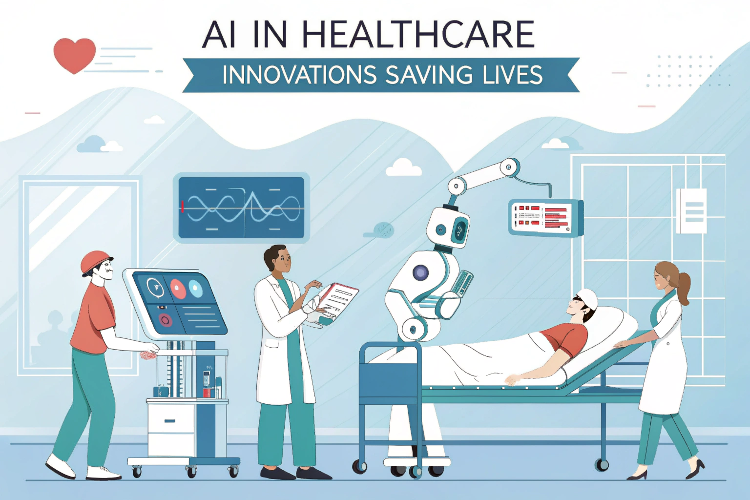Blog
AI in Healthcare: Innovations Saving Lives.
Artificial Intelligence & Automation ▪ 2025-03-07

Artificial intelligence (AI) is transforming healthcare, revolutionizing patient care, diagnostics, and treatment planning. From early disease detection to robotic surgeries, AI-driven innovations are improving efficiency and saving lives. With machine learning algorithms, predictive analytics, and automation, healthcare providers can deliver faster, more accurate, and personalized care to patients worldwide.
In this blog, we will explore how AI is revolutionizing healthcare, its real-world applications, key benefits, and what the future holds for AI-driven medical innovations.
The Role of AI in Healthcare
AI in healthcare involves using advanced algorithms and machine learning to analyze medical data, enhance diagnostics, and improve patient outcomes. By processing vast amounts of health records, AI-powered systems assist doctors in making informed decisions, reducing human errors, and optimizing treatment strategies.
1. AI in Medical Diagnostics
Medical diagnostics has been significantly enhanced with AI-driven solutions that offer:
-
Early disease detection: AI-powered imaging tools detect conditions like cancer, Alzheimer's, and heart disease at earlier stages.
-
Radiology and pathology analysis: AI models analyze X-rays, MRIs, and biopsies with higher accuracy than traditional methods.
-
Automated report generation: AI assists radiologists and pathologists by providing faster, detailed diagnostic reports.
2. AI-Powered Drug Discovery and Development
AI accelerates drug discovery by analyzing complex datasets and predicting potential drug candidates. Key contributions include:
-
Faster drug development: AI reduces the time needed to identify effective compounds and develop new medications.
-
Precision medicine: AI tailors treatments based on genetic and lifestyle factors, improving patient-specific therapies.
-
Clinical trial optimization: AI identifies suitable candidates for clinical trials, increasing success rates and efficiency.
3. AI in Robotic Surgeries
Surgical procedures have become more precise and minimally invasive with AI-assisted robotic systems. Benefits include:
-
Enhanced precision: AI-powered robotic arms perform complex surgeries with higher accuracy.
-
Reduced recovery time: Minimally invasive procedures lead to faster healing and reduced hospital stays.
-
Remote surgeries: Surgeons can perform operations from a distance using AI-driven robotic technology.
Real-World Applications of AI in Healthcare
AI is making significant contributions to various medical fields, from patient care to administrative efficiency. Some key applications include:
1. AI in Personalized Treatment Plans
AI analyzes patient data, medical history, and genetic information to create tailored treatment plans. Examples include:
-
Cancer treatment: AI helps oncologists develop personalized chemotherapy and immunotherapy plans.
-
Chronic disease management: AI predicts and prevents complications in conditions like diabetes and hypertension.
-
Mental health support: AI-driven chatbots provide psychological support and detect early signs of mental health disorders.
2. AI in Telemedicine and Virtual Health Assistants
With the rise of telemedicine, AI-powered chatbots and virtual assistants are transforming patient interactions:
-
24/7 patient support: AI-driven assistants answer medical queries and provide instant health guidance.
-
Remote patient monitoring: Wearable devices collect real-time health data and notify doctors of abnormalities.
-
Appointment scheduling: AI streamlines scheduling, reducing wait times and improving patient experience.
3. AI in Predictive Analytics for Disease Prevention
AI analyzes patterns in health data to predict disease outbreaks and prevent complications. Key applications include:
-
Pandemic prediction: AI tracks disease spread and helps governments implement timely interventions.
-
Early warning systems: AI identifies high-risk patients and recommends preventive measures.
-
Public health insights: AI aids policymakers in designing data-driven health strategies.
4. AI in Healthcare Administration and Workflow Optimization
AI streamlines hospital operations and reduces administrative burdens. Examples include:
-
Automated medical coding and billing: AI ensures accurate insurance claims and billing.
-
Supply chain management: AI optimizes inventory levels and reduces medication shortages.
-
Electronic health records (EHRs) management: AI enhances data retrieval and improves documentation efficiency.
Benefits of AI in Healthcare
The integration of AI in healthcare offers numerous advantages, including:
1. Faster and More Accurate Diagnoses
AI algorithms analyze medical images and records with higher precision, reducing diagnostic errors and misinterpretations.
2. Improved Patient Outcomes
AI-driven personalized treatment plans lead to better recovery rates and optimized care strategies.
3. Cost Savings and Efficiency
Automation reduces administrative costs, minimizes hospital readmissions, and streamlines resource allocation.
4. Increased Accessibility to Healthcare
AI-powered telemedicine expands access to medical services, especially in remote and underserved areas.
5. Enhanced Medical Research and Innovation
AI accelerates drug discovery and enables researchers to analyze complex medical data efficiently.
The Future of AI in Healthcare
As AI continues to evolve, future advancements will shape the next era of healthcare. Some key trends include:
1. AI-Driven Genomics and Precision Medicine
AI will revolutionize genomics, allowing for personalized disease prevention and targeted therapies.
2. AI in Wearable Health Tech
Smart wearables will provide real-time health monitoring, helping individuals track their wellness and detect early health risks.
3. AI-Powered Mental Health Support
Advanced AI chatbots and virtual therapists will improve mental health interventions and provide accessible support.
4. Ethical AI in Healthcare
Future developments will focus on ethical AI usage, ensuring transparency, data security, and bias-free decision-making.
5. AI and Human Collaboration in Medicine
AI will enhance, rather than replace, human expertise, enabling healthcare professionals to make better-informed decisions.

